Blog: Lockdown Learning, Usworth Colliery Primary School
Lockdown Learning - An interview with Gary Wright, Headteacher at Usworth Colliery Primary School
February 2021
We spoke to Gary Wright, Headteacher at Usworth Colliery Primary School in Washington, to find out what his school's journey has been like since the pandemic hit in March 2020. We covered many topics, including how creative education has been taught online, what challenges have been faced and what positives have come out of a very difficult situation.
Firstly Gary, can you tell us a little bit about you and your school?
"I have been headteacher at Usworth Colliery Primary School for 8-years. Our school teaches 380 children who range in age from reception class through to year 6. The pupils who attend our school face a lot of challenges as 80% are socially deprived in the bottom 30%, and 35% are in the bottom 10% of social deprivation. Although, as we’ve said, this can be challenging but it also offers lots of exciting opportunities for the pupils to grow and develop as well."
Can you tell me a little bit about the children and the work you did regarding developing creative before the pandemic?
"Many of our children lack resilience, when we would ask the children to get involved and perform, they would find this challenging. So we decided that we wanted to address this and looked at getting some support to do so."
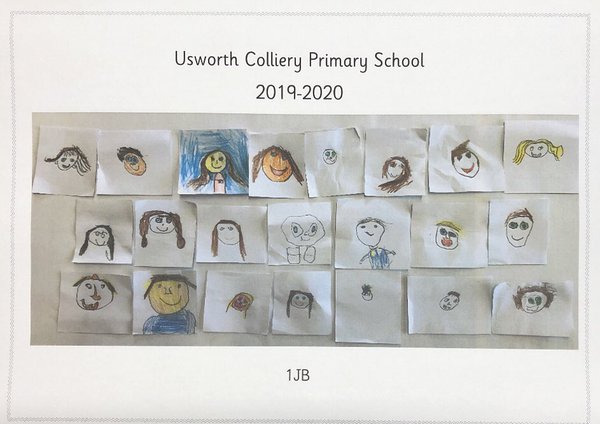
Image of a display that has been created in the school of the pupils' work.
Can you explain how Sunderland Culture has supported you with cultural and creative education?
"We applied for and won a bid to work with Sunderland Culture, who helped the school to embed arts and culture into our whole curriculum.
Rather than just offering the children wonderful one-off experiences, we wanted to ensure that arts and culture were threaded throughout the curriculum so that it could be developed upon each year. It was also vital for the school to include parents in our cultural and creative journey so they could understand what opportunities are available and learn about new resources, places and activities.
To make our plans a reality, the school received a grant of 30,000 over 3-years, but we actually didn't end up spending the full amount as we had lots of contacts and support though the cultural sector which we didn’t have to pay for."
How did you decide on what your ethos for the project with Sunderland Culture would be?
"Before we made our plans for change, we worked with everyone within the school, including parents, teachers, support staff, pupils, etc, to decide what we wanted to learn. We also made sure that our plans coincided with the Ofsted agenda of looking at the curriculum as a whole. So we came up with the following ethos that is the heart of everything we do.
Go places
See things
Meet new people and do new things.
One of the projects that we later developed with Sunderland Culture was creating a cultural passport for each child to document their experiences. We were looking to expand this idea and work with other local schools to develop the programme before March 2020."
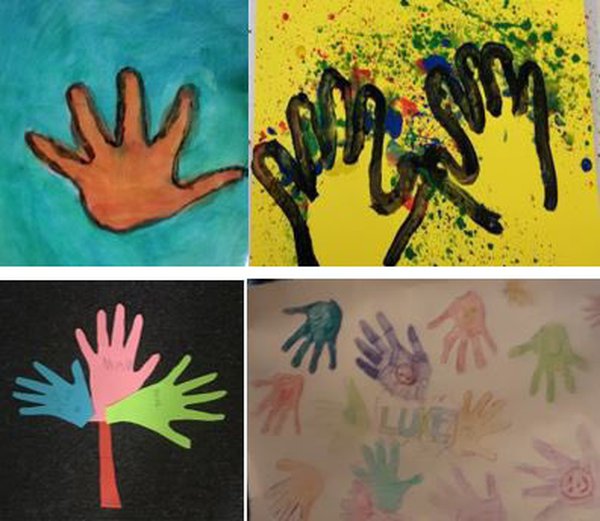
Hand art .
How have you made creative learning fun and engaging for pupils who have few resources at home?
"We have tried to be extremely mindful of what we are asking pupils to do? We have had to think about what everyone has at home and what is possible.
To give you some examples, we created a counting exercise where pupils had to count objects they found in their home. We also had pupils pick different objects in their house to represent different continents rather than asking them to draw or paint as some pupils wouldn’t have those resources."
We’ve heard that your school has been doing a lot of creative challenges over the past year. Can you explain what these have been?
"Yes, we’ve done some really fun challenges, from asking the children to recreate a famous piece of artwork at home and take a photo of themselves. We asked them to do a dance or fitness challenge and upload it on TikTok or Twitter in another challenge.
What is great about these challenges is all of the teaching staff demonstrated them first so it gave the pupils lots of ideas and confidence. Plus, what’s been great about all of them, is again, we have said use anything you can find. Pupils and parents don’t have a set list of objects they need. We want people to be as creative as possible and use anything they have to hand."
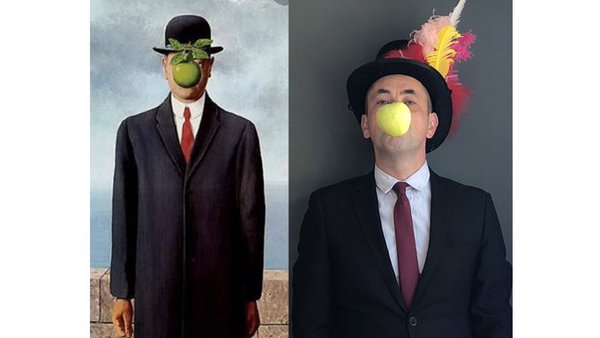
Art challenge.
How do the pupils and parents share the work they create at home with you?
"As a school, we use the programme’s Seesaw, Teams and Twitter. So pupils can upload their work to one of these platforms or even email it over to teachers. What is great is that teachers collate the work produced by pupils in school with the work shared online to create beautiful displays in the school as it is nice for all of the children to see what everyone is doing. We then send the children at home photos of the displays so they can see their work."
What have the biggest challenges of the pandemic been for the school?
"The biggest challenge we have faced has been making sure the whole school community is okay! That everyone's mental health is okay. Parents are struggling, and we are trying to support them as much as we can and also, many of my staff have challenges of also having to home-school or have partners working from home, etc. It’s been a huge change for everyone. We've all had to change how we interact with parents, and we now have a much more personal relationship with parents as we are speaking to them often on a daily basis."
What are the key points that have come out of teaching online?
"We can do it! We can take what we normally do and adapt it. Learning all of the tech has been challenging, but everyone has done an incredible job. The fact that we can do it and do it effectively. Obviously, it's not the same as teaching in school, but we are all doing our absolute best. We are always looking at improving and evolving so that remote learning works the best it can."
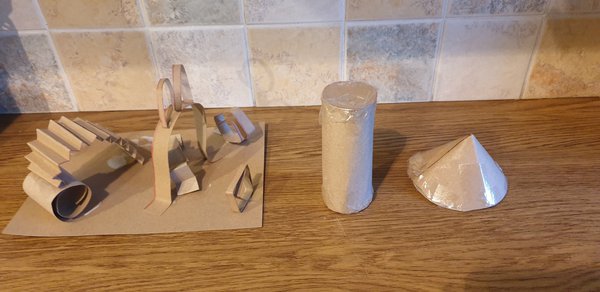
3D models made at home by pupils.
What are you most proud of?
"We've all worked together! Everyone has worked the best they can under so many difficult circumstances. Parents who are working full-time, parents who have young children to look after or elderly relatives, staff are also caring for their children at home. So everyone's circumstances are very different. I'm so appreciative of all of the hard work and effort everyone has put into it."
What normal school activities have now become virtual?
"Setting up virtual assemblies is something that the pupils really enjoy. I now pre-record all of the assemblies, and they feature topics such as worries, ambition and mental health. Our pupils have told us they really like singing along with the songs we have in the assemblies.
We also put our school performances and pantomime online this year, which was really fun, and all of the pupils and teachers got involved. Then I edited all of the footage together, and the whole school loved it, and it was brilliant to see all of the individual performances of the pupils."
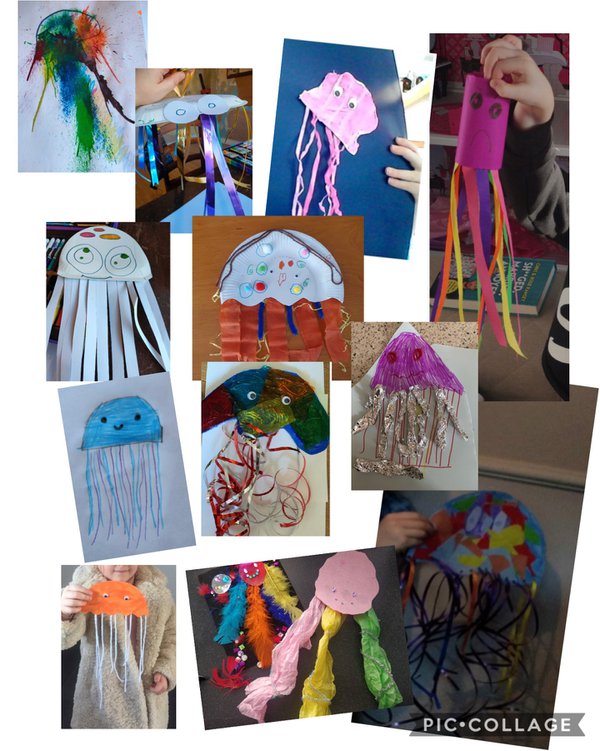
Jellyfish art.
Which compendium resource is your favourite?
"We've enjoyed the virtual tours of galleries like the Laing and the Great North museum online tours. Plus we are really looking forward to the up-coming CreatED sessions with Rob Kitchen where he will be exploring lots of new ways of teaching music. Click to find out more."
If you want to see our interview with Gary Wright simply click the video below:

